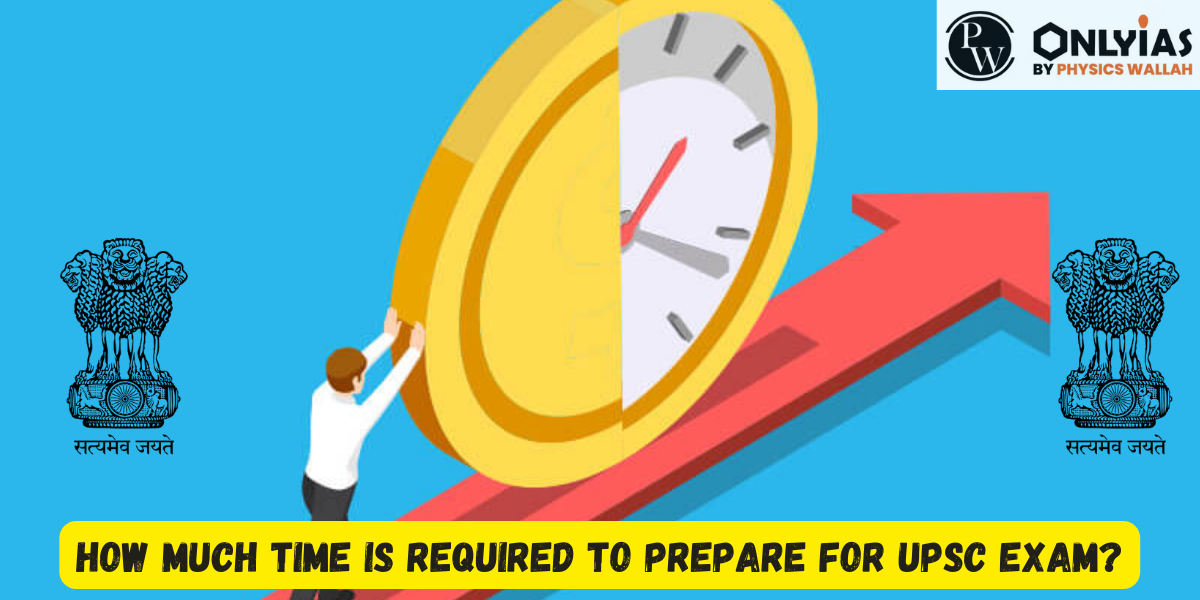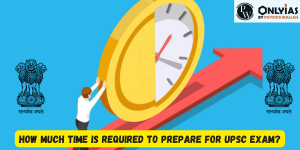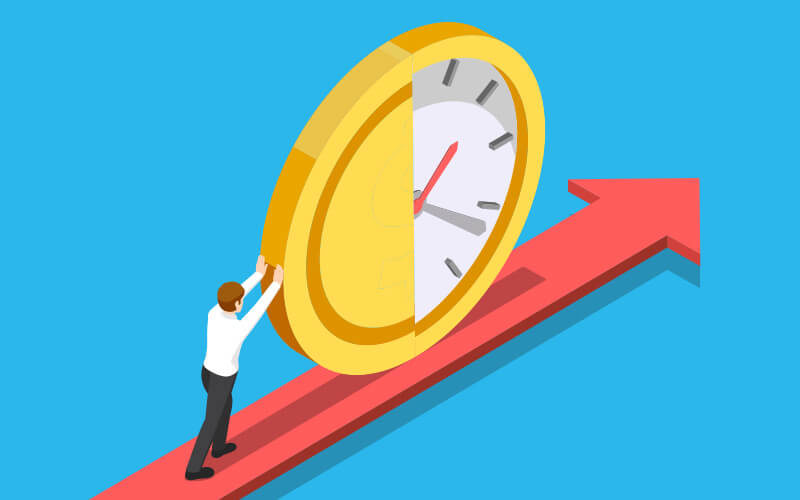
Initially, the query regarding the duration necessary for UPSC IAS exam preparation may appear to be a subjective matter. After all, the time needed to accomplish a specific task varies based on an individual’s abilities and capabilities. However, this is a question that troubles numerous individuals aspiring for the IAS. They are either seeking to organize their UPSC IAS Exam readiness or searching for reassurance through a response. In this piece, we aim to address this significant inquiry by taking into account the diverse factors influencing UPSC exam preparation.

Commencing the journey towards preparing for the UPSC exam prompts the question of how much time is truly required to achieve success. This seemingly personal inquiry is underpinned by a multitude of variables that shape the timeline for UPSC IAS exam readiness. Let’s delve into these factors that play a pivotal role in determining the preparation duration:
The UPSC syllabus is akin to an expansive ocean, encompassing a diverse array of subjects. The syllabus is not static; the inclusion of the current affairs segment ensures its perpetual expansion. Delve into the comprehensive UPSC syllabus to gain insights into its multifaceted nature.
Beyond the expanse of the syllabus, the UPSC exam format contributes to the extensive preparation timeline. The examination unfolds in three distinct stages, spanning nearly a year:
1. UPSC Prelims Exam: Conducted in June/August, this stage involves two objective papers.
2. UPSC Mains Exam: Held in October/December, it comprises nine descriptive papers.
3. UPSC Personality Test: Also known as the UPSC Board Interview, this phase occurs in March/April/May.
The realm of the civil services exam is characterized by fierce competition. Countless aspirants partake in the IAS prelims exam annually, yet only a fraction emerges victorious. Securing a high rank is particularly challenging for top-tier services like IAS and IFS, intensifying the competition. Excelling in the UPSC exam requires going the extra mile to outshine candidates from esteemed institutions such as IITs and IIMs.
Navigating the vast IAS syllabus often raises concerns about retaining acquired knowledge. Regular revision is indispensable to ensure the recall of approximately 85% of the material. Beyond revision, mock tests serve as invaluable tools for honing exam-taking skills, enhancing speed, and refining writing abilities.
Considering these influential factors, it becomes evident that preparing for the IAS exam at home demands careful consideration and planning. On average, a comprehensive preparation period spans approximately 10-12 months, yet instances of candidates achieving success within 6 months or even facing challenges over 6 years are not uncommon. External factors, such as guidance and strategy, are universal, but internal attributes like dedication, commitment, and perseverance vary among individuals.
The time required to prepare for the UPSC IAS Exam is intricately intertwined with the aspirant’s journey. By embracing effective external guidance and igniting the internal drive for excellence, candidates can streamline their preparation trajectory. The quest to conquer the IAS exam is highly personalized, showcasing that while some may achieve success in 4 years, others may triumph within a year. The interplay of external support and internal motivation holds the key to expediting the journey toward clearing the UPSC IAS Exam.
Becoming an IAS officer is a dream harbored by many aspirants, often comes with a multitude of questions and uncertainties. The journey towards mastering the complexities of the UPSC examination and securing a coveted position in the civil services requires not only dedication and hard work but also a comprehensive understanding of the preparation process.
We delve into some of the most common queries that arise in the minds of UPSC aspirants, shedding light on key aspects of the preparation journey and offering insights to help quell doubts and pave the way for a successful pursuit of the IAS dream. From timelines and strategies to study materials and exam patterns, we aim to address these queries and provide clarity to those who are embarking on this challenging yet rewarding endeavor.
Indeed, one year is ample time for comprehensive IAS preparation. While coaching is not obligatory, a rigorous self-study regimen, guided by the UPSC syllabus and relevant material, can lead to success. Focusing on syllabus comprehension during the initial six months and dedicating the latter half to revision, mock tests, and past papers is a prudent approach.
Embarking on IAS preparation involves a structured approach encompassing several key steps:
1. Understand the UPSC exam pattern.
2. Familiarize yourself with the UPSC exam syllabus.
3. Study past UPSC question papers.
4. Prepare for IAS general studies.
5. Develop proficiency in essay writing and relevant subjects.
While two months may seem limited, success is feasible with strategic planning:
1. Prioritize prelims preparation, especially the CSAT paper.
2. Thoroughly study relevant NCERT books.
3. Conclude exam preparation at least two weeks prior to each stage and allocate time for revision.
4. Engage in extensive mock test practice and address weak areas.
During training, IAS officers receive a stipend based on the 7th CPC recommendations, amounting to Rs 45,000 per month. This stipend consists of an in-hand component of Rs 38,500, with Rs 10,000 being deducted for food, residential facilities, and transport.
Upon completing training at LBSNAA, a newly appointed IAS officer receives an approximate monthly salary of Rs 1,30,000. Variations may occur based on location and nature of posting. The basic pay for new IAS officers is approximately Rs. 56,100, while a Chief Secretary’s fixed salary is Rs 2,50,000 per month.
Clearing UPSC without coaching is attainable through focused self-study, the right strategy, and proper guidance. Effective self-studying and diligence can lead to success within a year, even without coaching.
The UPSC IAS Exam assesses the application of knowledge to administrative challenges. Subjects encompass:
1. General studies (Reasoning, Verbal Ability, Quantitative Ability, and General Awareness).
2. Language (English and One Indian Language).
3. One of 48 optional subjects for UPSC.
The UPSC IAS Exam syllabus is comprehensive, encompassing:
1. Prelims: General Studies (Reasoning, Verbal Ability, Quantitative Ability, and General Awareness).
2. Mains: General Studies (Reasoning and General Awareness), Language (English and One Indian Language), and one of 48 optional subjects for UPSC. The syllabus tests analytical skills and the ability to apply knowledge to administrative challenges.
The age limit for IAS is typically between 21 and 32 years. Certain exemptions apply for candidates from marginalized sections and military personnel, extending the age limit up to 42 years based on eligibility categories.
Preparing for UPSC IAS Exam at home is possible with dedication, focus, and the right approach. Master the art of self-study, maintain a goal-oriented mindset, and create a study timetable exclusively for UPSC preparation to succeed.
In essence, the time required to prepare for the UPSC IAS exam is an amalgamation of external guidance, internal motivation, and effective strategies. With commitment, perseverance, and the pursuit of excellence, aspirants can achieve success within a timeframe that aligns with their individual journey.

Against common misconceptions, it is indeed feasible to successfully prepare the UPSC IAS exam within a span of one year.
It is entirely feasible to succeed in the UPSC exam without the assistance of coaching. The notion that coaching is a prerequisite to conquer the UPSC Exam is simply a misconception. Aspiring candidates who maintain a strong focus and implement their strategies adeptly can undoubtedly achieve success in the Civil Services Examination (CSE) on their initial attempt.
A prevalent misconception among aspirants revolves around the notion that achieving consistent academic excellence is a prerequisite, and UPSC toppers are inherently gifted scholars since their early schooling. However, this assumption is purely unfounded. If you're questioning whether an average student can conquer the IAS exam, the resounding answer is YES!
In 2016, Mr. Ansar Shaikh achieved the distinction of becoming India's youngest IAS officer by securing the top rank in the UPSC IAS Exam. Remarkably, he accomplished this feat on his inaugural attempt at just 21 years of age, attaining an impressive 361st rank nationwide.
<div class="new-fform">
</div>
